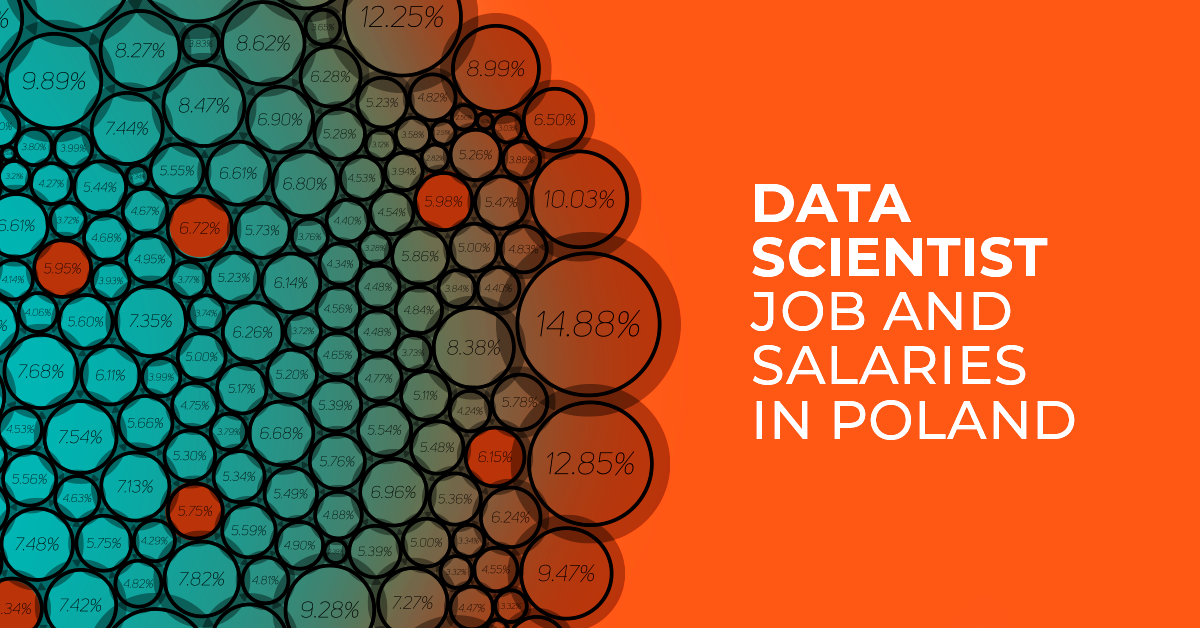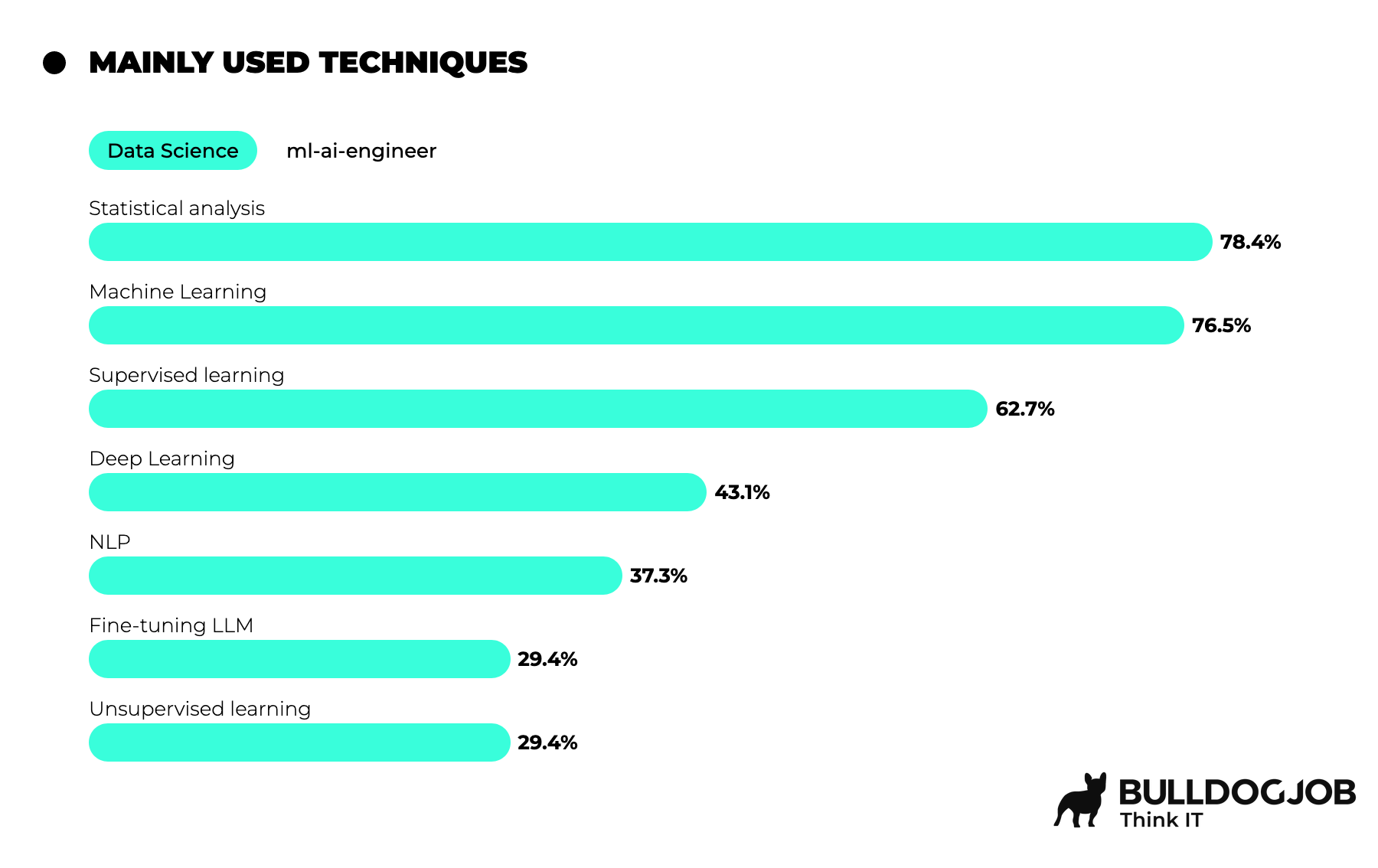Data Scientist Salary in Poland in 2025

Data Science is in vogue. This field attracts the interest not only of people already employed in the IT industry but also those planning a career change. Optimistic future prospects are also encouraging – everywhere you hear that it is the specialization of the future, and advanced data analytics will systematically expand into new areas of life.
This state of affairs is a good reason to check how the situation of people working as Data Scientists on the Polish labor market looks in practice today. Especially since we have reliable sources of information – such as our IT Community Survey 2025.
Who are a Data Scientists and What Do They Do?
A Data Science specialist, also called a data scientist, is a person who deals with analyzing large amounts of information in order to gain valuable conclusions and knowledge from it. Imagine you have a huge box full of puzzles, and the specialist's task is to assemble them to create a clear picture. Using various tools and techniques, such an expert can transform raw data into useful information that can help companies make decisions, predict trends, or solve problems. In short, a Data Science specialist helps us understand the world based on the data we collect.
The main tasks they may encounter are:
- Data Exploration: Before proceeding to deeper analysis, the specialist must understand the data they are dealing with. This means examining its structure, origin, and quality.
- Data Processing and Cleaning: Not all data is immediately ready for analysis. It often contains errors, gaps, or unnecessary information. The specialist's task is to prepare this data so that it is consistent and reliable.
- Model Building: The Data Science specialist uses various techniques and algorithms to create mathematical models that predict certain phenomena or behaviors based on available data.
- Visualization: The results of the analysis are often presented in the form of graphics, diagrams, or heat maps. This makes complex dependencies and patterns understandable even for people who are not data experts.
- Communication with Business: The Data Science specialist must also be able to convey their conclusions and recommendations to the people responsible for making decisions in the company. Their communication skills are therefore just as important as their technical ones.
Is a University Degree Needed to Work as a Data Scientist?
Looking at the data for currently working Data Science and AI specialists, it seems that higher education is the norm. Unlike some other specializations in IT where you encounter people without a completed degree, in Data Science, over half (51.7%) of specialists have completed second-cycle studies (Master's degree). Additionally, 18% hold a Bachelor's or Engineer's title (first-cycle studies), and 12.4% can boast of obtaining a doctoral title.
Data Scientist – Work and Technologies
Let's look at the skills and technologies most often used in this position, based on the latest data.
Let's start with the programming languages (and scripting and query languages) used in their work by Data Science specialists. Python leads decisively, used by as many as 94.1% of specialists in this field. In the next place is the query language SQL, which is very useful for extracting data – used by nearly 59% of those surveyed. It is worth noting that the popularity of the R language, once often mentioned in the context of data analysis, has significantly decreased in the daily work of Data Scientists according to this data.
Now let's look at the most popular tools in Data Science. The list here is quite long, but a few items clearly dominate. The Pandas library (used by 94.1%) and Jupyter Notebook (78.4%) are absolute essentials. Scikit-learn (72.5%), a key library for machine learning and data analysis, takes another important spot. Tools such as Excel (52.9%), PyTorch (33.3%), Tensorflow (23.5%), and Keras (21.6%) are also popular.
So, let's see which techniques are most frequently used. Statistical Analysis (78.4%) remains the foundation, but Machine Learning (76.5%) is right beside it. More advanced methods are increasingly used, such as Supervised Learning (62.7%), Deep Learning (43.1%), Natural Language Processing (NLP - 37.3%), and even fine-tuning Large Language Models (LLM - 29.4%) and Unsupervised Learning (29.4%).

Data Scientist – Earnings in Poland
Let's take a closer look at earnings in the Data Science area in Poland in 2025, analyzing available data by contract type, specific position (Data Scientist vs ML/AI Engineer), and experience level.
Let's remember that:
- The result for an employment contract (UoP) is the "take-home" amount (net).
- The results for a B2B contract are the net amount on the invoice (before deducting social security, income tax, and costs).
Data Science Earnings on Employment Contract (UoP)
Earnings here differ quite significantly depending on the level of experience. Unfortunately, this is still quite a niche position in Poland, and we haven't collected enough data points to present unambiguous results for every experience level; average and median data for juniors is missing.
Moving to specifics, a Mid or Regular Data Scientist can expect a take-home pay of 9,250 PLN, and a Senior already 12,675 PLN.
Medians do not differ significantly: Mid - 8,600 PLN, Senior around 12,500 PLN.
Data Science Earnings on B2B Contract
A sufficient sample was collected for the Mid/Regular level, and here it turned out that such a specialist earns an average of 16,022 PLN on the invoice, and the median was 15,200 PLN.
Meanwhile, a Senior Data Scientist earns an average of 30,100 PLN, and the median was 30,000 PLN.
Summary
Now you know more about the earnings for Data Science and can assess whether these conditions suit you. If you are interested in working with this technology, check out the Data Science job offers on Bulldogjob.com.
We also strongly encourage you to familiarize yourself with our Always Up-to-date Salary Report, which is updated continuously and has separate reports for most specializations. Check below.
Knowing the current salary realities will certainly help you make beneficial career decisions 👌🏻
